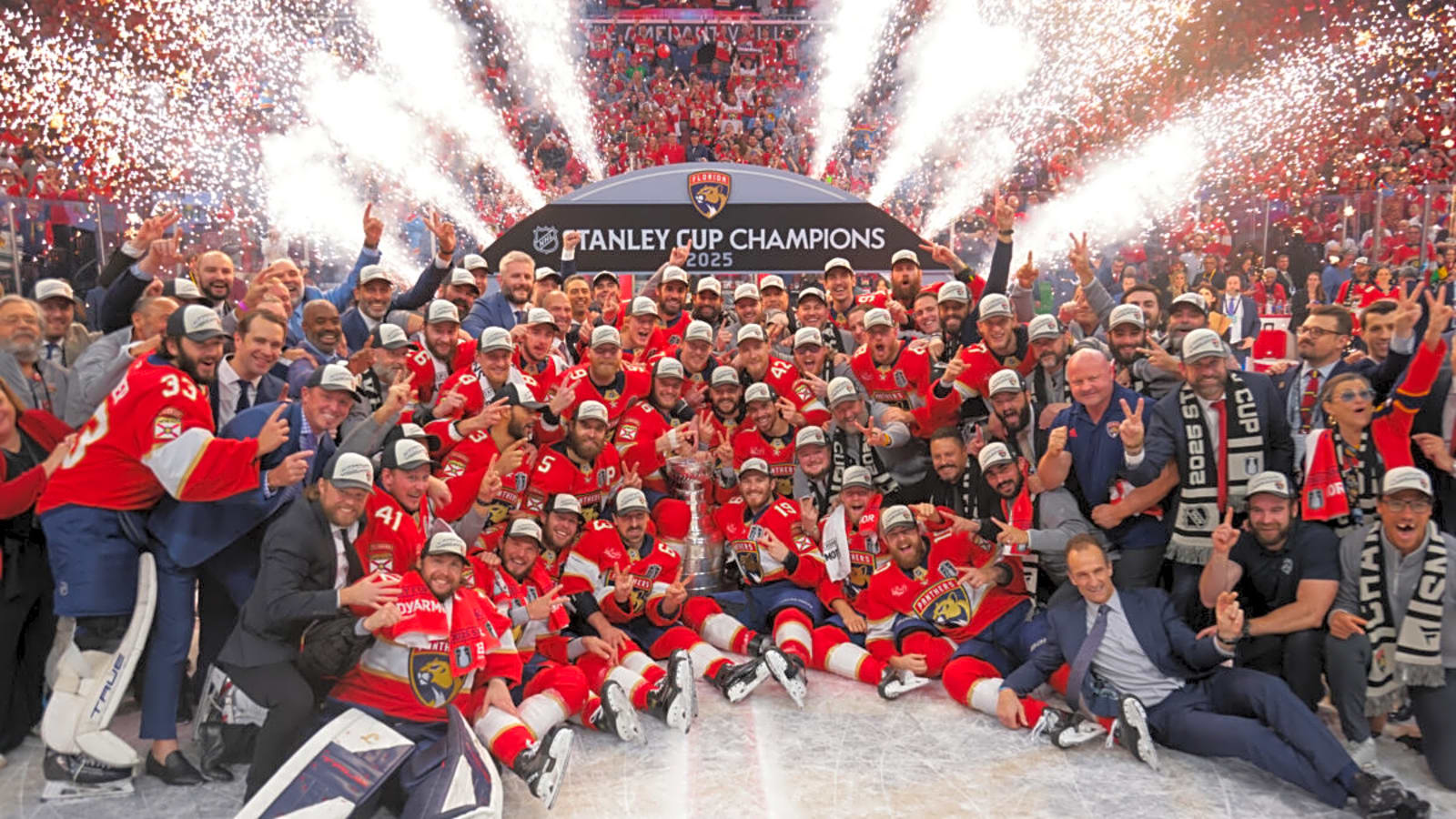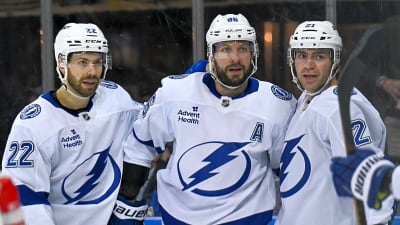
The Florida Panthers have officially entered dynasty territory. With their second consecutive Stanley Cup championship, and third appearance in the Final in as many years, the Cats have asserted themselves as the model franchise in the NHL right now. Their rise hasn’t been fueled by generational superstars or lottery luck, but rather a blend of smart management, relentless depth, suffocating defensive structure, and timely goaltending. For a rebuilding team like the Montreal Canadiens, Florida’s blueprint offers several valuable lessons. As Kent Hughes and Jeff Gorton look to guide the Habs back to contention, studying the Panthers’ structure and philosophy is not only useful, it’s essential.
Depth Wins Championships
When you look at Florida’s roster, no one player jumps out with eye-popping playoff stats. In their 2024-25 playoff run, no Panther recorded more than 23 points, yet nine of them had at least 15. That kind of balanced scoring reflects a team that can roll lines and pairings without hesitation. Consider that Brad Marchand, one of the NHL’s most effective playoff performers, was playing on Florida’s third line. Meanwhile, veteran defenseman Nate Schmidt played solid minutes on the third pair and looked revitalized.
Florida’s depth allowed them to wear teams down over long series. Their forecheck never let up, and their bottom six contributed meaningfully, not just in energy, but in goals. It’s a continuation of a trend seen in other Cup-winning squads. The Vegas Golden Knights in 2023 had a similar outlook. The Tampa Bay Lightning’s back-to-back Cups were defined by the dominance of their third line featuring Yanni Gourde, Blake Coleman, and Barclay Goodrow. The Pittsburgh Penguins had multiple role players step up during their 2016 and 2017 runs.
For the Canadiens, this should be a point of emphasis. Having top-end talent like Nick Suzuki and Lane Hutson is important, but Montreal won’t contend unless the middle of the roster, lines two, three and four, and bottom defence pairings are dangerous, effective, and consistent. That means putting emphasis on acquiring reliable depth players and developing their American Hockey League (AHL) talent pool properly. It’s not just about stars; it’s about the whole machine running smoothly.
Defensive Structure
While Florida can score, it’s their defensive discipline that stood out this postseason. The Panthers made life miserable for Connor McDavid and Leon Draisaitl in the Final. Aleksander Barkov, the Selke Trophy winner, and Sam Reinhart, the runner-up, were a masterclass in two-way play. But they weren’t alone. Anton Lundell and Eetu Luostarinen handled heavy defensive assignments and excelled, giving head coach Paul Maurice multiple shutdown options regardless of matchup.
On the blue line, Gustav Forsling has emerged as one of the NHL’s premier shutdown defencemen. Claimed off waivers in 2021, Forsling’s skating, stickwork, and positioning are elite. Niko Mikkola, acquired as a depth piece, played a key role with his size and defensive awareness. Florida’s D-core isn’t filled with household names, but it functions as a cohesive, stingy unit. The addition of Seth Jones at the deadline was another masterclass move by general manager (GM) Bill Zito.
The Canadiens, by contrast, still have a ways to go in that department. The Habs struggled at times this season in the defensive zone and could use a shutdown player like Forsling on defence. Losing David Savard won’t necessarily help. More importantly, they’re still far from mastering the team-wide defensive commitment Florida showed. Defensive buy-in isn’t optional, it’s the bedrock of playoff hockey.
Goaltending Is Still King
You can’t win without goaltending, and Sergei Bobrovsky proved exactly why. The veteran netminder was a rock throughout the playoffs, going 16-7 with a .914 save percentage and a 2.20 goals-against average. He made key saves when it mattered and often served as the last line of defence during high-pressure situations. Against the Edmonton Oilers, Bobrovsky was the difference, clearly outdueling Stuart Skinner.
In the modern NHL, where parity reigns and every team has offensive weapons, a hot goalie can tilt the scales. Just ask the 2021 Canadiens, who had Carey Price lead the team all the way to the Final. Bobrovsky’s solid postseason wasn’t just about numbers, it was about poise, leadership, and making the save at the right moment.
For Montreal, the goaltending future looks good. Samuel Montembeault has shown flashes and had a solid 2024-25 season, but he’s not yet proven he can steal a series. Jacob Fowler and Jakub Dobes remain the future between the pipes, but goaltending is unpredictable. The Habs need to make sure their pipeline is strong and that they have a plan in place, because in the playoffs, nothing matters more than your goalie.
Elite Management Builds Identity
Perhaps the most underrated part of Florida’s success is how well-constructed their roster is. Zito’s work as GM has been nothing short of elite. He’s turned around the franchise without handing out a single albatross contract. While Florida benefits from the lack of state income tax, Zito still deserves credit for getting players signed before their value becomes too high.
From grabbing Forsling off waivers to landing key players like Sam Bennett, Reinhart, and Mikkola at bargain prices, the Panthers’ front office has built a team that’s tailored for playoff success: physical, disruptive, defensively sound, and mentally tough. They don’t have holes, and they don’t make excuses.
Montreal’s front office, still early in its tenure, has shown promise. The Kirby Dach and Alex Newhook trades were forward-thinking, and the Canadiens have wisely stayed out of free agent bidding wars. But to truly follow Florida’s model, Montreal must stay disciplined. That means no overpayments, maximizing assets, and building a true team identity. The Canadiens must figure out who they want to be, not just skillful, but hard to play against. A team that makes opponents uncomfortable.
The Panthers are more than just champions, they’re a clear example of how to build a contender in today’s NHL. Their success wasn’t about luck, but layers: depth, defence, goaltending, and smart management. These are the same pillars the Canadiens must prioritize as they move forward with their rebuild.
Montreal has pieces. They have promise. But Florida’s back-to-back Cups show just how far attention to detail, commitment to a system, and a clear organizational vision can take you. If the Canadiens want to one day parade down Sainte-Catherine again, they’d be wise to study every shift the Panthers played this spring. Because the blueprint is right there.
More must-reads:
- Stars sign former first-round pick to four-year extension
- Wayne Gretzky criticizes Oilers after Stanley Cup loss
- The '5+ goals in one Stanley Cup Final in the Modern Era' quiz
Breaking News
Trending News
Customize Your Newsletter
 +
+
Get the latest news and rumors, customized to your favorite sports and teams. Emailed daily. Always free!








